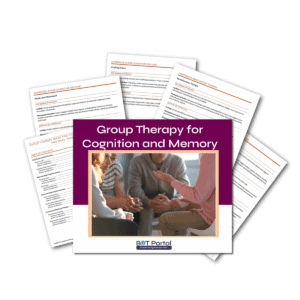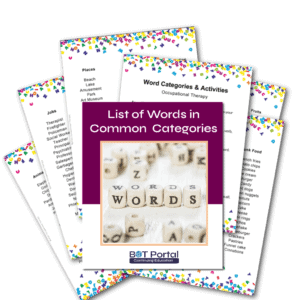Description
Alphabetizing – Executive Function
Sorting, Attention, Working Memory, Problem Solving
This alphabetizing worksheet will help your client or student work on and improve language skills and alphabet organization. This activity will require your student to alphabetize the 20 category-based items.
Keywords: Sorting, Attention, Memory, Problem-Solving, Executive Function
In the realm of occupational therapy, cognitive rehabilitation is paramount in restoring and enhancing clients’ functional abilities. Alphabetizing, often overlooked, is a fundamental cognitive skill that holds significant relevance in daily life activities. Today, we’re introducing a game-changing resource: 15 different categories of Alphabetizing worksheets. These printable sheets not only engage clients in alphabetizing tasks but also incorporate timing elements and memory testing, revolutionizing cognitive therapy sessions.
But why is alphabetizing so crucial? Let’s delve into the neuroscience behind it. When clients engage in alphabetizing activities, several key brain regions come alive. The prefrontal cortex, responsible for executive functions like problem-solving and decision-making, kicks into high gear as clients organize and sequence letters. The hippocampus, vital for memory formation and retrieval, gets a workout as clients recall alphabetical order and categorize words. Additionally, the parietal lobe, involved in spatial processing and attention, is activated as clients scan and locate letters within the worksheets.
The activation of these brain regions doesn’t just stay confined to therapy sessions; it translates seamlessly into day-to-day life activities. Consider a client recovering from a stroke. As they improve their alphabetizing skills, they enhance their ability to organize grocery lists, locate items in alphabetical order on shelves, and sort through mail efficiently. For individuals returning to work, sharpened alphabetizing abilities streamline tasks like filing documents, organizing emails, and navigating digital databases.
Now, let’s paint a picture with a real-life example. Meet James, a young professional recovering from a traumatic brain injury. James struggles with memory and attention deficits, impacting his ability to manage his workload effectively. Through targeted alphabetizing exercises using the printable worksheets, James not only strengthens his cognitive skills but also experiences tangible improvements in his work performance. As he becomes more proficient in alphabetizing, James finds himself navigating through spreadsheets and organizing data with newfound ease, ultimately regaining confidence in his occupational roles.
By incorporating these Alphabetizing worksheets into therapy sessions, occupational therapists empower clients to reclaim independence in daily life activities. The timed exercises not only challenge clients to improve their speed and accuracy but also facilitate memory testing, reinforcing cognitive gains over time. From grocery shopping to workplace tasks, alphabetizing skills serve as a cornerstone for success in various occupational endeavors. Say goodbye to mundane therapy activities and hello to dynamic cognitive rehabilitation with these innovative worksheets.
In this packet:
(15) Category-specific sorting and alphabetizing activity worksheets
Other helpful links:
Check out BOT Portal: Resource Site for Occupational Therapy Students and Practitioners




